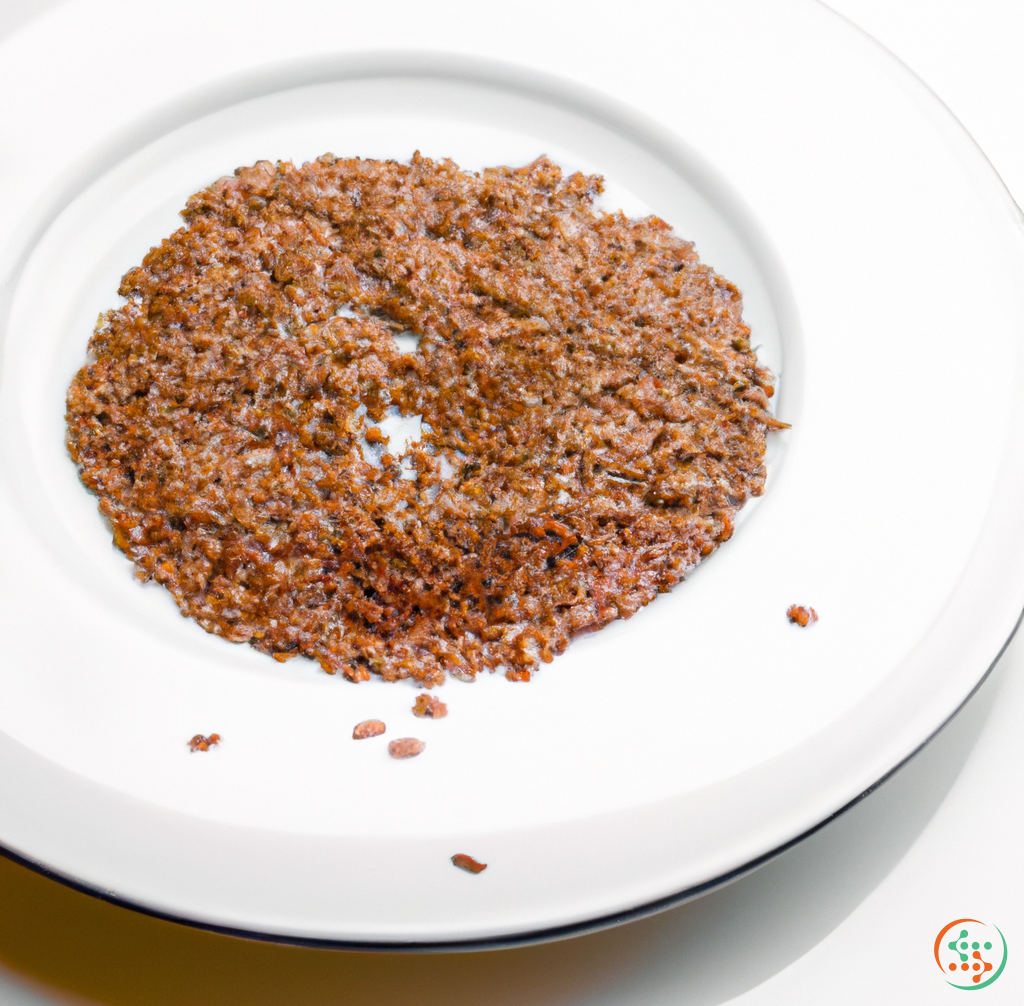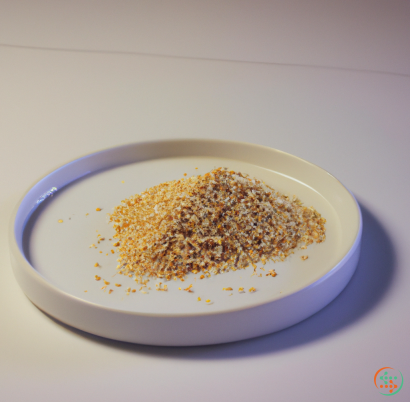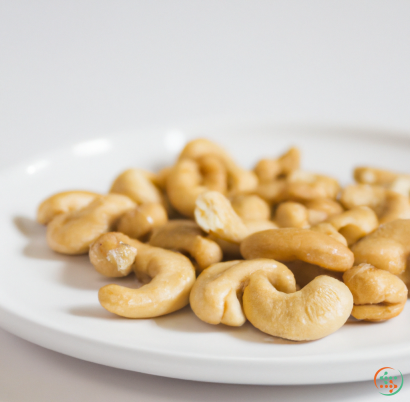Flaxseed
, how to use it and the health benefits
What is Flaxseed?
Flaxseed, also known as linseed, is a small, dark-brownish seed that comes from the flax plant (Linumspp.). It is one of the oldest cultivated crops and was used in ancient times for its oil-rich seeds, fiber and medicinal properties. Flaxseed contains omega-3 fatty acids, fiber and lignans, which provide numerous health benefits.
Uses of Flaxseed
Flaxseed can be used in a variety of ways, including adding it to smoothies, oatmeal, yogurt or salads. It can also be used as an egg replacer in baking recipes and as a way to thicken soups and sauces. Ground flaxseed is a more digestible form, as whole flaxseed may pass through the digestive tract undigested. Adding ground flaxseed to baked goods and other foods is an easy way to incorporate more omega-3 fatty acids into the diet. For best results, ground flaxseed should be stored in an airtight container in the refrigerator to preserve freshness and prevent spoilage.
Health Benefits of Flaxseed
Flaxseed provides a number of health benefits, mainly due to its omega-3 fatty acid content, fiber and lignan content. Omega-3 fatty acids are essential fatty acids, meaning they cannot be produced by the body and must come from the diet. These fatty acids have been found to reduce inflammation, lower the risk of cardiovascular disease, improve cognitive function and reduce arthritis pain.
Flaxseed’s high fiber content helps keep the digestive system running smoothly, while its lignan content has a number of beneficial effects including reducing the risk of cancer and hormone-related diseases. Flaxseed is also rich in manganese, which is important for metabolism, bone development and wound healing.
In addition to its many health benefits, flaxseed is relatively inexpensive and very versatile, making it an easy and tasty addition to many recipes.
Side Effects of Flaxseed
Although flaxseed is generally considered safe for most people, there are a few potential side effects that should be taken into consideration. Flaxseed is high in fiber and may cause bloating and gas in some people. Additionally, consuming too much flaxseed can be constipating, so it is important to limit intake to 1-2 tablespoons per day. Finally, flaxseed contains oxalates, which may increase the risk of kidney stones in some people.
Conclusion
Flaxseed is a small dark-brown seed with numerous nutritional and medicinal benefits due to its omega-3 fatty acid, fiber and lignan content. It can be easily added to recipes or taken as a supplement. Though generally safe for most people, there are a few potential side effects, so it is important to talk to a doctor before consuming large amounts of flaxseed.
In today’s world, health-conscious people are recognizing the importance of incorporating healthy options in their diets. One of the prominent additions often seen in grocery stores shelves is flaxseed. This small golden seed packs a powerful punch of essential nutrients. But, you’d be surprised to know that flaxseed must travel a long journey before reaching your dinner plate.
So, let’s take a journey and explore the origin and production process of flaxseed – from the farm to your dinner plate.
Where Do Flax Customers Come From?
Flaxseed or linseed as it is also known, comes from the flax plant (Linum usitatissimum) which is an annual herb native to the region between the Mediterranean and Northern India. Flax plants are generally Found in temperate climates and thrive in rich, well-drained soils and full sunlight. From this large expanse of land, two species of flax are typically grown: brown flax and gold flax. The former has higher fiber content, while the latter is richer in omega-3 fatty acids.
The Growing and Harvesting of Flax Seeds
When it comes to growing flax, water is an important factor necessary for the plant’s flourishing. To provide adequate irrigation and nutrition, flax cultivators practice minimal chemical inputs, including use of pesticides or chemical fertilizers and thus, many of the flaxseed crops are Certified Organic and free from chemical residue.
The harvest generally takes place between late July and early August when the flaxseed will have reached its fullest maturity. On the farm, the flaxseed is harvested by special harvesting machines. These machines are designed to systematically pick the flax plant and separate the flaxseed from its straw and husk. Threshing is done manually or mechanically and the separated flaxseed is then collected for further processing.
Processing Flaxseed
The first step in processing is cleaning, where the flaxseed is subjected to scouring and rinsing. The main purpose of this stage is to remove the weed seed and debris attached to the flaxseed. Further processing includes drying, grading, sieving, and winnowing.
Drying is done to reduce the moisture content of the flaxseed. It is important that the seed is not overly heated during this process in order to ensure the nutritional value of the seed is maintained.
The next stage of processing is grading. This involves sorting the seed according to size, shape, and color parameters. The sorted seed is further sieved or handpicked to achieve uniformity in size and shape. Lastly, the batch of flaxseed is winnowed to remove the broken, defective, immature or discolored seeds which do not meet the accepted quality standards.
Packaging and Storage
Once the flaxseed has been processed and graded, it is pushed towards one of the stages of packaging. The packaging used needs to be airtight to prevent oxidization of the flaxseed. It should also be protected from direct sunlight and moisture.
It is common practice for flaxseed to be stored in grain silos or bulk containers to ensure proper air circulation and temperature control. The grain can remain stored for a period of up to 12 months without any degradation of quality if it is in properly sealed containers.
Transfer to Retail Stores
Once the flaxseed is packaged and stored, it is ready for export or local retail distribution. The flaxseed is loaded into bulk shipping containers and transported to retail centers. Retail centers include supermarkets, health food stores, and online retailers.
The flaxseed is sold in various forms such as whole seed, ground meal or powder, oil, and flax fortified products such as bread and crackers. Flaxseed consumers can purchase it to enjoy the beneficial components found in its nutty, crunchy texture.
Nutritional Breakdown of Flaxseed
Now that you know the journey taken by flaxseed, let’s take an in-depth look at why people are embracing the often-overlooked seed.
Flaxseed is an excellent source of dietary fiber, They are also a significant source of health-promoting fats, providing an optimal ratio of omega-3 and omega-6 fatty acids.
On top of its rich fatty acid content, flaxseed also provides folate, vitamin B 6, and niacin. Vitamin B 6 plays an essential role in the metabolism of essential amino acids. Niacin is important for the production of energy and the maintenance of healthy nerve cells.
Moreover, grains like flax are incredibly high in antioxidants and minerals. These components protect the body against disease and help to maintain good health. Additionally, flax contains lignans which have been studied for their potential health benefits. Lignans have been linked to the prevention of certain cancers.
Finally, flaxseed is very low in calories and therefore makes a great addition in weight management programs.
Eating and Enjoying Flaxseed
As with other seeds, for optimum health benefits, ground flaxseed should be consumed. It is advised to consume ground flax regularly, up to 40 grams daily is considered safe. It should be noted that the consumption of large amounts of flaxseed can lead to various digestive problems.
Whole flaxseed is not easily digested and may pass through the gastrointestinal tracts without being absorbed. On the other hand, ground seeds are extensively digested which allows for easier absorption of its beneficial components.
Ground flaxseed can either be added to your diet directly or as a supplement. For direct consumption, you can sprinkle it in smoothies, oatmeal, cereal, sauces and yogurt. As an alternative to ground flaxseed, flax oil can also be used. The oil has a pleasant taste, making it an ideal addition to salads or soups.
Conclusion
Flaxseed is an extremely versatile and nutritious addition to any recipe. There are plenty of recipes available that incorporate flaxseed, these range from oatmeal or smoothies, to cookies and crackers.
Remember that for the most effective results, ground flaxseed must be consumed on a regular basis. Though ground flaxseed has more health benefits, it can lead to digestive issues if consumed in higher amounts. So, always start slow, a recommended dosage of 30 grams of ground flaxseed is best taken daily.
Now you know the journey of flaxseed – from the farm to your dinner plate. The journey may be long but the rewards are worth it. By incorporating flaxseed in your diet, you can reap its numerous health benefits, and enjoy knowing that you’re doing something good for your body and soul.
| Vitamin E | 0.31 mg | |
| Vitamin K | 0.0043 mg | |
| Vitamin C | 0.6 mg | |
| Vitamin B1 | 0.00164 grams | |
| Vitamin B2 | 0.16 mg | |
| Vitamin B3 | 0.00308 grams | |
| Vitamin B4 | 0.0787 grams | |
| Vitamin B5 | 0.99 mg | |
| Vitamin B6 | 0.47 mg | |
| Vitamin B9 | 0.087 mg |
| Calcium | 0.255 grams |
Daily Value 1.3 g
|
| Iron | 0.00573 grams |
Daily Value 0.018 g
|
| Magnesium | 0.392 grams |
Daily Value 0.4 g
|
| Phosphorus | 0.642 grams |
Daily Value 1.25 g
|
| Potassium | 0.813 grams |
Daily Value 4.7 g
|
| Sodium | 0.03 grams |
Daily Value 2.3 g
|
| Zinc | 0.00434 grams |
Daily Value 0.011 g
|
| Copper | 0.00122 grams |
Daily Value 0.9 mg
|
| Manganese | 0.00248 grams |
Daily Value 0.0023 g
|
| Selenium | 0.0254 mg |
Daily Value 0.055 mg
|
| Tryptophan | 0.297 grams | |
| Threonine | 0.766 grams | |
| Isoleucine | 0.896 grams | |
| Leucine | 1.235 grams | |
| Lysine | 0.862 grams | |
| Methionine | 0.37 grams | |
| Cystine | 0.34 grams | |
| Phenylalanine | 0.957 grams | |
| Tyrosine | 0.493 grams | |
| Valine | 1.072 grams | |
| Arginine | 1.925 grams | |
| Histidine | 0.472 grams | |
| Alanine | 0.925 grams | |
| Aspartic Acid | 2.046 grams | |
| Glutamic Acid | 4.039 grams | |
| Glycine | 1.248 grams | |
| Proline | 0.806 grams | |
| Serine | 0.97 grams |
| Glucose | 0.4 grams |
|
| Sucrose | 1.15 grams |
|
| Total Sugars | 1.6 grams |
per 100g
|
| Myristic acid (14:0) | 0.01 grams |
|
| Palmitic acid (16:0) | 2.17 grams |
|
| Stearic acid (18:0) | 1.33 grams |
|
| Arachidic acid (20:0) | 0.05 grams |
|
| Behenic acid (22:0) | 0.05 grams |
|
| Lignoceric acid (24:0) | 0.03 grams |
|
| Total Saturated fatty acids: | 3.64 g | |
| Nervonic acid (24:1) | 0.06 grams |
|
| Erucic acid (22:1) | 0.01 grams |
|
| Oleic acid (18:1) | 7.36 grams |
|
| Palmitoleic acid (16:1) | 0.02 grams |
|
| Gadoleic acid (20:1) | 0.07 grams |
|
| Total Monounsaturated fatty acids: | 7.52 g | |
| Omega-6 Eicosadienoic acid (20:2) | 0.01 grams |
|
| Linolenic acid (18:3) | 22.81 grams |
|
| Linoleic acid (18:2) | 5.9 grams |
|
| Total Polyunsaturated fatty acids: | 28.72 g | |
| Stigmasterol | 0.01 grams |
|
| Campesterol | 0.05 grams |
|
| Beta-sitosterol | 0.09 grams |
|
| Total Sterols: | 0.15 g | |







